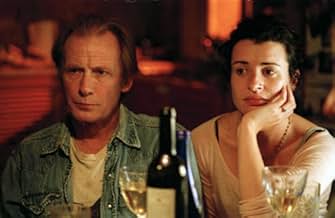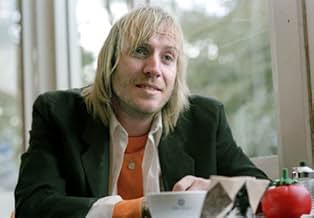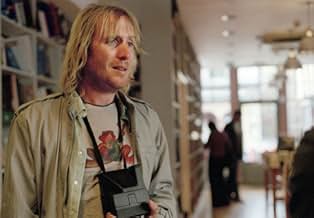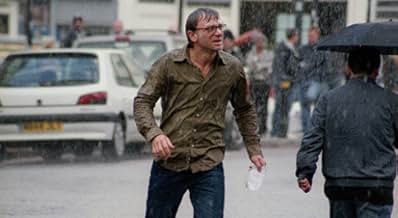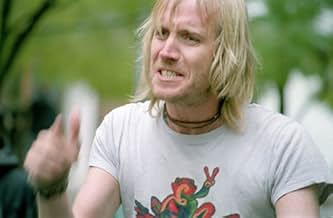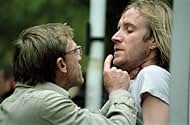Two strangers become connected by a tragedy, yet one dangerously feels that the connection goes much deeper than the other is willing to admit.Two strangers become connected by a tragedy, yet one dangerously feels that the connection goes much deeper than the other is willing to admit.Two strangers become connected by a tragedy, yet one dangerously feels that the connection goes much deeper than the other is willing to admit.
- Awards
- 4 wins & 12 nominations total
Jeremy McCurdie
- Boy in Balloon
- (as Jeremy Mccurdie)
Rosie Michell
- Katie Logan
- (as Rosanna Michell)
- Director
- Writers
- All cast & crew
- Production, box office & more at IMDbPro
Featured reviews
(since antirealist already beat me to the first...)
Oddly, I happen to be the person who asked Michell why he chose to use a hand-held camera on Saturday, and his initial response ("Why not?") was a bit flippant, but at the same time, I'm guessing the filmmakers weren't intending to give anything other than glib answers to the puffball questions they were expecting. (When asked if they felt the film perpetuated the negative stereotype of the mentally ill being violent, director Michell dismissed the allegation out of hand before Rhys Ifans stepped in with a quick-hit one-liner about being "completely sane, but I'm feeling a bit violent about that question." That should do it for intelligent discourse at THIS Q&A, thank you...)
The camera-work is a bit distracting, not necessarily because it's hand-held but because the reason for it -- which Michell did say was to represent a first person POV -- is so obvious. In particular, there are a few scenes in which the camera sneaks around behind walls and windows to catch a better view of the characters that screams "you're being watched," which generally sums up my main concern about the film: it telegraphs almost everything.
For a psychological thriller, it isn't nearly as taut or unpredictable as it needs to be. It also lags notably between plot points, content to bleed off any steam it may have picked up from a previous scene. Part of this problem could be caused by the trailer's reliance on exposing nearly every twist in the film, and part of it could be on the film's overuse of "thriller music" that, in the cut I saw, nearly overpowered all five senses every time it appeared in the mix.
However, the acting is generally impressive, yet understated. Daniel Craig does a wonderful job at portraying the complexities of a rational man who comes unhinged in the aftermath of a bizarre accident and the resultant stalker he's burdened with. And there was at least one twist that made me jump, so all is not lost on the tension front.
Last thought: I was stunned by the film's equation of homosexuality, theology and mental illness. I'm not sure what exact conclusion it (or the book) is trying to come to, but I'm guessing the post-screening Q&A wasn't the place to bring it up...
Oddly, I happen to be the person who asked Michell why he chose to use a hand-held camera on Saturday, and his initial response ("Why not?") was a bit flippant, but at the same time, I'm guessing the filmmakers weren't intending to give anything other than glib answers to the puffball questions they were expecting. (When asked if they felt the film perpetuated the negative stereotype of the mentally ill being violent, director Michell dismissed the allegation out of hand before Rhys Ifans stepped in with a quick-hit one-liner about being "completely sane, but I'm feeling a bit violent about that question." That should do it for intelligent discourse at THIS Q&A, thank you...)
The camera-work is a bit distracting, not necessarily because it's hand-held but because the reason for it -- which Michell did say was to represent a first person POV -- is so obvious. In particular, there are a few scenes in which the camera sneaks around behind walls and windows to catch a better view of the characters that screams "you're being watched," which generally sums up my main concern about the film: it telegraphs almost everything.
For a psychological thriller, it isn't nearly as taut or unpredictable as it needs to be. It also lags notably between plot points, content to bleed off any steam it may have picked up from a previous scene. Part of this problem could be caused by the trailer's reliance on exposing nearly every twist in the film, and part of it could be on the film's overuse of "thriller music" that, in the cut I saw, nearly overpowered all five senses every time it appeared in the mix.
However, the acting is generally impressive, yet understated. Daniel Craig does a wonderful job at portraying the complexities of a rational man who comes unhinged in the aftermath of a bizarre accident and the resultant stalker he's burdened with. And there was at least one twist that made me jump, so all is not lost on the tension front.
Last thought: I was stunned by the film's equation of homosexuality, theology and mental illness. I'm not sure what exact conclusion it (or the book) is trying to come to, but I'm guessing the post-screening Q&A wasn't the place to bring it up...
Enduring Love is complex psychologically, and treads grounds that attempt to expose the nature of post traumatic experience, and the important issue of obsession. There's a cruel irony here, as one man's obsession upon another man, an almost incomprehensible assault that must have its true source in mental illness (rather than the tragedy that binds these characters), in turn tragically becomes an obsession for the victim, as he struggles in vain to understand this unwanted attention in a most British and gentlemanly way. It exposes to a great extent just how vulnerable social conventions can be in the way Englishmen interact with each other. I found it interesting that this nightmare may have been mitigated had the victim's de facto/bed partner (another aspect of the swirling psychologies) been just a tad more supportive. Is that the feminine side of Englishness? Grow a backbone, you find the solution, you're the man? This is the sort of movie that Uni students could write papers on and discuss for hours. It was engrossing, to be sure, but I'm an Australian and thus docked it a couple of points for being infuriating. Part of the soundtrack has a beautiful classical, pastoral melody. Other parts, those of tightened tension, are more severe. I wondered if two composers were employed for this. At its core this movie has a huge heart, is a showcase for wonderful actors, is high quality, and surely must have been one of the best and most interesting movies of its year.
Out in the country for a nice picnic, Joe and Claire get involved in a ballooning accident that leads to the death of one of the men who came to help. Joe seems to get over it but he does obsess over whether or not he could have done more. This obsession is fed when he begins being stalked by one of the men who was also involved in the accident Jed, who appears to believe that Joe and him are close and belong together as a result of what they shared. As Jed continues to get close, Joe appears to be coming apart, putting a great deal of strain on his relationship with Claire.
When I went to see this film I had no idea whatsoever what it was about and the first four minutes of the film had as much of an impact on me as I'm told the start of the book did. With the accident (that is frighteningly convincing) the seeds are sown for a film that is about love, mental health and about a sort of Fatal Attraction vibe. I use the last description with reservations because I don't think this is comparable to Fatal Attraction because this has so much more to it than just the bunny boiler stuff. Instead the story mixes it with Joe's own sanity crumbling at the same time as Claire's 'enduring love' for him is put to the test. I have not read the book, but for my money the film did this pretty well, producing plenty of good dialogue that meant the film was more about the character of Joe than it was about Jed. This is not say it is totally perfect because it isn't; the fatal attraction thing easily takes the focus meaning that some parts of the audience may feel that this is the whole ball game and that all the 'talking' is what gets in the way. For me, I felt the other way, the fatal attraction thing weakened the film when it is the focus and, for this reason, I didn't like the extra ending during the credits because I felt that the open ending had done fine on its own.
The writing is good but the film relies very heavily on the performances and, luckily they are all good where they need to be. Craig is fast becoming someone who is headed for big things, not only does he have the body of a star but he can really act too. Here he is a convincing 'normal' person and his initial polite bemusement by Jed is realistic, as his gradual descent into instability himself. Morton may have less time but she is equally convincing and realistic in showing that love always has limits everywhere except in the movies. Ifans is good even though he has the roles of the religious fanatic, mentally ill, homosexual stalker to deal with. Whether or not it was wise to link all those aspects or not is one matter but Ifans still does well never really resorting to showboating or easy 'mad man' stuff. I wasn't totally won over by him because Craig was my focus, but he still did well. Support from Nighy, Lynch etc is OK but really they are minor roles and not anywhere near the centre of the film.
Overall this is a strange film and anyone who dismisses it as being a rip off of Fatal Attraction has totally missed the point. Instead the film looks at love, at sanity and relationship all in a well-written script that is well delivered by a couple of very good actors in the lead roles. Not to everyone's tastes then and not the easiest one to really put into a nutshell but interesting, moving and satisfyingly lacking in gloss throughout.
When I went to see this film I had no idea whatsoever what it was about and the first four minutes of the film had as much of an impact on me as I'm told the start of the book did. With the accident (that is frighteningly convincing) the seeds are sown for a film that is about love, mental health and about a sort of Fatal Attraction vibe. I use the last description with reservations because I don't think this is comparable to Fatal Attraction because this has so much more to it than just the bunny boiler stuff. Instead the story mixes it with Joe's own sanity crumbling at the same time as Claire's 'enduring love' for him is put to the test. I have not read the book, but for my money the film did this pretty well, producing plenty of good dialogue that meant the film was more about the character of Joe than it was about Jed. This is not say it is totally perfect because it isn't; the fatal attraction thing easily takes the focus meaning that some parts of the audience may feel that this is the whole ball game and that all the 'talking' is what gets in the way. For me, I felt the other way, the fatal attraction thing weakened the film when it is the focus and, for this reason, I didn't like the extra ending during the credits because I felt that the open ending had done fine on its own.
The writing is good but the film relies very heavily on the performances and, luckily they are all good where they need to be. Craig is fast becoming someone who is headed for big things, not only does he have the body of a star but he can really act too. Here he is a convincing 'normal' person and his initial polite bemusement by Jed is realistic, as his gradual descent into instability himself. Morton may have less time but she is equally convincing and realistic in showing that love always has limits everywhere except in the movies. Ifans is good even though he has the roles of the religious fanatic, mentally ill, homosexual stalker to deal with. Whether or not it was wise to link all those aspects or not is one matter but Ifans still does well never really resorting to showboating or easy 'mad man' stuff. I wasn't totally won over by him because Craig was my focus, but he still did well. Support from Nighy, Lynch etc is OK but really they are minor roles and not anywhere near the centre of the film.
Overall this is a strange film and anyone who dismisses it as being a rip off of Fatal Attraction has totally missed the point. Instead the film looks at love, at sanity and relationship all in a well-written script that is well delivered by a couple of very good actors in the lead roles. Not to everyone's tastes then and not the easiest one to really put into a nutshell but interesting, moving and satisfyingly lacking in gloss throughout.
Having never read Ian McEwan's original novel from which this film is based, I can't rightly judge whether or not this was a successful adaptation. However, I can say that as a standalone work, Enduring Love is one of the more interesting films to be released within the last couple of years and, as a successful British film, is one to rank alongside other recent UK successes like Dead Man's Shoes and Vera Drake. Having watched the film a couple of times, I was left with the urge to go away and discover McEwan's original novel (as was the case when I saw the film adaptation of his other key-work, The Cement Garden), as the film, although highly interesting and emotionally engaging, certainly left me asking a lot of questions.
The opening scene really sets the mood and pace (and of course, the plot) for the rest of the film... not to mention standing as one of the most exciting, engaging and downright jaw-dropping moments of visceral, cinematic tension-building that I've seen in a long time. Here, director Roger Michell juxtaposes the lush greenery of the Oxfordshire countryside - with it's rolling hills and vast, ocean-like sky - with a billowing, blood red, hot-air-balloon, waving as dangerously as the frantic, hand-held cameras that capture the action. The editing is punchy and creates a rhythm that works towards heightening the confusion felt by the characters, as the quiet, countryside picnic of writer/professor Joe and his sculptress girlfriend Claire is disrupted by the sight of the balloon, and the appalling tragedy to come. As the story progresses, the couple try to put the event to the back of their minds and carry on as normal with their comfortable, bourgeois lives of luncheons, dinner-parties & work-related accolades, however, when another one of the witnesses to the event contacts Joe out of the blue, we see the beginnings of a bizarre and dangerous relationship that will push all three protagonists beyond the regular boundaries of reason.
Some have likened the film to something like Fatal Attraction, with the idea of obsession and guilt both featuring as central to both... however, for me, Enduring Love was much more of a treatise on the nature of love, and the whys and wherefores of such. For example, it is important to note that Joe is a professor who studies the nature of love, and the human qualities one would require to endure love, when, in reality, it is the unhinged and unwanted fellow witness Jed that really understands the true sense of blind obsession, so central to such feelings.
The style of the film manages to be both low-key and visually distinctive, with Michell employing a style similar to his previous film, The Mother, with hand-held cameras that offer a reality - but also, manage to convey the wavering uncertainty and voyeuristic intrusion so central to the plot - coupled with staccato editing, optical filters, rich composition and an extraordinary use of locations (all captured in glorious 2:35.1 widescreen). The performances are of an extremely high calibre as well, with Daniel Craig bringing a smug-pomposity, but also a vulnerability to his role of the logical professor pushed to an illogical limit, whilst Samantha Morton offers support as the bewildered Claire, who has to question Joe's mental stability as he begins obsessing about the accident and his newly acquired "friend". However, much more impressive, if only for the fact that he delivers a performance completely against every other role I've ever seen him attempt, is Rhys Ifans, who embodies the lonely and perhaps somewhat disturbed Jed with a quiet, contemplative spirit that goes against the kind of melodramatic, raving lunatics found in similar, Hollywood endeavours.
The interplay between the three characters is wonderfully handled by Michell, who paces the film deliberately, so that the relationships only becomes truly apparent over a gradual period of time. Now, this may infuriate some viewers who expect a much quicker film that gets straight to the point, but I for one admired the gradual build and felt that it made the relationship between Joe and Jed much more metaphysical (bringing up all kinds of questions about fragmented personalities, two-halves of the same soul, repressed guilt, angst, sexual frustration and schizophrenia), whilst also forcing us to question who is really insane? This is just one question that the film left me with as the credits began to roll, with Michell and screenwriter Joe Penhall leaving a lot of minor-details unresolved, thus, allowing the audience to fill in the blanks. Again, this may annoy some viewers... and I must admit, I myself was left scratching my head on a number of occasions (not least, the scene that takes place after the final credits), but having gone back and watched the film a second time you realise that so much of the emotional background and the character motivation is there in those great performances.
It's certainly a film that will leave you with something to think about, if not only the relationship between the characters, then certainly the rationality of them leading up to that tense, edge-of-the-seat final. For me, Enduring Love was a great film that kept me interested throughout and left me with a lot of questions that have been running through my mind over the last couple of weeks. I appreciate the fact that a lot of viewers seek some kind of emotional resolution from a film, but I feel that people who don't necessarily expect every single loose end to be neatly tucked away by the end credits - or those that enjoy thinking about both the characters and the story once the film has come to a close - will certainly enjoy and appreciate this.
The opening scene really sets the mood and pace (and of course, the plot) for the rest of the film... not to mention standing as one of the most exciting, engaging and downright jaw-dropping moments of visceral, cinematic tension-building that I've seen in a long time. Here, director Roger Michell juxtaposes the lush greenery of the Oxfordshire countryside - with it's rolling hills and vast, ocean-like sky - with a billowing, blood red, hot-air-balloon, waving as dangerously as the frantic, hand-held cameras that capture the action. The editing is punchy and creates a rhythm that works towards heightening the confusion felt by the characters, as the quiet, countryside picnic of writer/professor Joe and his sculptress girlfriend Claire is disrupted by the sight of the balloon, and the appalling tragedy to come. As the story progresses, the couple try to put the event to the back of their minds and carry on as normal with their comfortable, bourgeois lives of luncheons, dinner-parties & work-related accolades, however, when another one of the witnesses to the event contacts Joe out of the blue, we see the beginnings of a bizarre and dangerous relationship that will push all three protagonists beyond the regular boundaries of reason.
Some have likened the film to something like Fatal Attraction, with the idea of obsession and guilt both featuring as central to both... however, for me, Enduring Love was much more of a treatise on the nature of love, and the whys and wherefores of such. For example, it is important to note that Joe is a professor who studies the nature of love, and the human qualities one would require to endure love, when, in reality, it is the unhinged and unwanted fellow witness Jed that really understands the true sense of blind obsession, so central to such feelings.
The style of the film manages to be both low-key and visually distinctive, with Michell employing a style similar to his previous film, The Mother, with hand-held cameras that offer a reality - but also, manage to convey the wavering uncertainty and voyeuristic intrusion so central to the plot - coupled with staccato editing, optical filters, rich composition and an extraordinary use of locations (all captured in glorious 2:35.1 widescreen). The performances are of an extremely high calibre as well, with Daniel Craig bringing a smug-pomposity, but also a vulnerability to his role of the logical professor pushed to an illogical limit, whilst Samantha Morton offers support as the bewildered Claire, who has to question Joe's mental stability as he begins obsessing about the accident and his newly acquired "friend". However, much more impressive, if only for the fact that he delivers a performance completely against every other role I've ever seen him attempt, is Rhys Ifans, who embodies the lonely and perhaps somewhat disturbed Jed with a quiet, contemplative spirit that goes against the kind of melodramatic, raving lunatics found in similar, Hollywood endeavours.
The interplay between the three characters is wonderfully handled by Michell, who paces the film deliberately, so that the relationships only becomes truly apparent over a gradual period of time. Now, this may infuriate some viewers who expect a much quicker film that gets straight to the point, but I for one admired the gradual build and felt that it made the relationship between Joe and Jed much more metaphysical (bringing up all kinds of questions about fragmented personalities, two-halves of the same soul, repressed guilt, angst, sexual frustration and schizophrenia), whilst also forcing us to question who is really insane? This is just one question that the film left me with as the credits began to roll, with Michell and screenwriter Joe Penhall leaving a lot of minor-details unresolved, thus, allowing the audience to fill in the blanks. Again, this may annoy some viewers... and I must admit, I myself was left scratching my head on a number of occasions (not least, the scene that takes place after the final credits), but having gone back and watched the film a second time you realise that so much of the emotional background and the character motivation is there in those great performances.
It's certainly a film that will leave you with something to think about, if not only the relationship between the characters, then certainly the rationality of them leading up to that tense, edge-of-the-seat final. For me, Enduring Love was a great film that kept me interested throughout and left me with a lot of questions that have been running through my mind over the last couple of weeks. I appreciate the fact that a lot of viewers seek some kind of emotional resolution from a film, but I feel that people who don't necessarily expect every single loose end to be neatly tucked away by the end credits - or those that enjoy thinking about both the characters and the story once the film has come to a close - will certainly enjoy and appreciate this.
A freak balloon accident in the Oxfordshire countryside involving five men and a child results in the death of an Oxford GP. One of the men is a writer-teacher called Joe (Daniel Craig) who is obsessed with the fact that love may be a science and on top of that he is finding it hard to come to terms with what happened at the accident. This is causing tension between him and his sculptor girlfriend Claire (Samantha Morton) and the situation is worsened when he is contacted by one of the other men in the accident. The man is a loner called Jed (Rhys Ifans), a homosexual who believes that the accident was meant to bring him and Joe together and he begins stalking him wherever he goes with ultimately dangerous results.
ENDURING LOVE adapted from a novel by Ian McEwan is a long and complex thriller, but one that never fails to grip the audience with NOTTING HILL director Roger Michell skillfully blending the mixture of themes including Joe's obsessive theories about love (which are ultimately turned upside down), the impact of the stalking and how it affects the relationship between Claire and Joe and the latter's guilt about the accident. Michell is ably assisted by a first rate cast including Daniel Craig as Joe who was brilliant in this year's British gangster blockbuster LAYER CAKE and Rhys Ifans from NOTTING HILL is splendid as the gay stalker. Samantha Morton also deserves praise as Joe's lover and it is sad to know that ENDURING LOVE isn't likely to find an audience beyond the art-houses. It is well above the quality of some of the hopelessly pretentious offerings our country has turned out in recent years like TRAUMA and THE RATCATCHER.
ENDURING LOVE adapted from a novel by Ian McEwan is a long and complex thriller, but one that never fails to grip the audience with NOTTING HILL director Roger Michell skillfully blending the mixture of themes including Joe's obsessive theories about love (which are ultimately turned upside down), the impact of the stalking and how it affects the relationship between Claire and Joe and the latter's guilt about the accident. Michell is ably assisted by a first rate cast including Daniel Craig as Joe who was brilliant in this year's British gangster blockbuster LAYER CAKE and Rhys Ifans from NOTTING HILL is splendid as the gay stalker. Samantha Morton also deserves praise as Joe's lover and it is sad to know that ENDURING LOVE isn't likely to find an audience beyond the art-houses. It is well above the quality of some of the hopelessly pretentious offerings our country has turned out in recent years like TRAUMA and THE RATCATCHER.
Did you know
- TriviaJed (Rhys Ifans) can be seen in the background of many scenes, most notably the art gallery, where he exits to the right promptly.
- SoundtracksGod Only Knows
Written by Brian Wilson & Tony Asher
Published by Rondor Music London Ltd on behalf of Sea of Tunes Pub. Co.
- How long is Enduring Love?Powered by Alexa
Details
- Release date
- Country of origin
- Language
- Also known as
- Вічне кохання
- Filming locations
- Production companies
- See more company credits at IMDbPro
Box office
- Gross US & Canada
- $358,362
- Opening weekend US & Canada
- $34,610
- Oct 31, 2004
- Gross worldwide
- $1,875,649
- Runtime1 hour 40 minutes
- Color
- Sound mix
- Aspect ratio
- 2.35 : 1
Contribute to this page
Suggest an edit or add missing content



